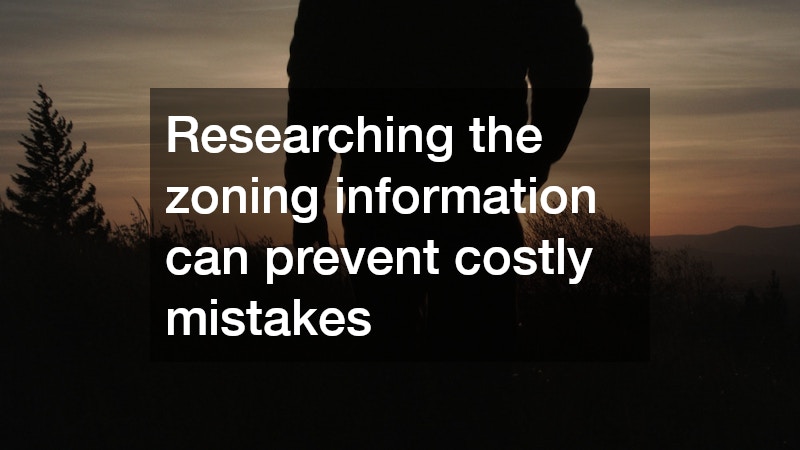Investing in vacant land can be an enticing prospect for many, offering opportunities to build your dream home, engage in agriculture, or develop a profitable business project. However, purchasing vacant land comes with a unique set of challenges and considerations. In this article, we will explore the key factors to consider when looking at vacant land for sale.
Understanding Zoning and Land Use
Before purchasing vacant land, it is crucial to understand the zoning regulations and permitted land use in the area. Local zoning laws dictate what activities can occur on a plot of land, and these restrictions can significantly impact your intended use.
For example, you may have plans to build a residential property, but if the land is zoned for commercial purposes, you could face legal hurdles.
Researching the zoning information can prevent costly mistakes and ensure that your plans align with the legal framework. Furthermore, zoning laws can change over time, so it’s essential to stay updated with any amendments or proposed changes in the area. Engaging with local planning and zoning departments can provide valuable insights and ensure you have accurate and current information.
Aside from understanding the present zoning laws, evaluate potential changes in the future that could affect your investment. In areas of rapid development, zoning can often be revised to accommodate new businesses or residential areas. Keeping abreast of these developments will help you make informed decisions and anticipate potential future challenges or opportunities for your vacant land investment.
Evaluating Accessibility and Infrastructure
Accessibility and infrastructure are critical components to consider when purchasing vacant land. Analyze the ease of access to the plot, as limited access could hinder development and reduce future value. Consider factors such as road maintenance, proximity to major highways, and accessibility during adverse weather conditions.
Beyond accessibility, assess existing infrastructure like water supply, electricity, and sewage systems. If these basic utilities aren’t readily available, the cost to install or extend them can be substantial, impacting the feasibility of your intended development. Investigate local utility providers and gather information on the existing services to understand potential installation timelines and costs.
Another essential factor to evaluate is the possibility of future infrastructure enhancements in the area. City expansion plans or public works projects can increase the value of your land by improving access and utilities. Keeping informed about local government plans and community development initiatives may provide you with hints of how the land’s value could evolve over time.
Environmental Considerations and Restrictions
Environmental factors can significantly affect the viability and cost of developing vacant land. Conduct an environmental assessment to identify issues like soil quality, potential contamination, or flood risks. These factors can incur additional expenses for remediation or require changes in development plans.
For instance, land located in flood zones might necessitate elevated construction techniques or specialized drainage systems, adding layers of complexity and cost. Similarly, soil tests may reveal challenges with stability or nutrient levels that could affect construction or agricultural prospects. Be prepared for unforeseen challenges by consulting with environmental experts and reviewing historic environmental assessments.
Additionally, be aware of any environmental restrictions or conservation easements that may be in place. These legal agreements can limit the extent of development to preserve the natural environment, potentially impacting your plans. Thoroughly understanding these restrictions will ensure compliance and help avoid future legal issues while maintaining sustainable development objectives.
Financial Implications and Investment Potential
Before committing to purchasing vacant land, it is vital to evaluate the financial implications and investment potential of the property. Beyond the purchase price, consider potential costs related to taxes, maintenance, and development. Due diligence in calculating these costs will help ensure that your investment remains financially viable.
Additionally, recognize that vacant land purchases typically require different financing options than built properties. Many traditional mortgage lenders view vacant land as a riskier investment, which can result in higher interest rates or more stringent lending requirements. Prepare for these challenges by exploring diverse financing options, such as land loans from specialized lenders, which can accommodate your investment goals.
In terms of investment potential, conduct a market analysis to understand the property’s appreciation prospects. Review comparable sales data, examine historic trends in the area, and consider upcoming developments or economic factors that could influence property values. By doing so, you can make more informed decisions that align with your long-term investment goals and market conditions.
Legal and Compliance Issues
Navigating the legal landscape is an essential aspect of purchasing vacant land. Property laws can vary significantly between regions, and misunderstandings can lead to costly disputes or delays. Engaging a real estate attorney who specializes in land transactions can offer valuable guidance throughout the process.
Ensure that a thorough title search is conducted to identify any existing liens, deed restrictions, or boundary discrepancies. Resolving these issues before purchase can prevent future legal challenges and secure a clear path for land development. Additionally, verify compliance with local, state, and federal regulations that could impact your investment.
Beyond legal red tape, building a collaborative relationship with local government agencies and stakeholders can facilitate a smoother acquisition and development process. Open communication with zoning boards, utility providers, and community groups can foster cooperative solutions that align with your objectives and the area’s broader public interests. By integrating these elements into your due diligence process, you can mitigate risks and optimize the potential of your vacant land investment.
Investing in vacant land requires careful consideration of numerous factors, from zoning and infrastructure to environmental and legal issues. By conducting thorough research and seeking professional guidance, you can navigate these complexities and make informed decisions. Whether you aim to build a home, start a business, or hold the land as an investment, understanding these critical elements will empower you to maximize the potential of vacant land for sale.




